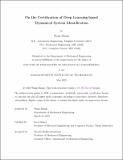On the Certification of Deep Learning-based Dynamical System Identification
Author(s)
Zhang, Wang
DownloadThesis PDF (5.338Mb)
Advisor
Daniel, Luca
Terms of use
Metadata
Show full item recordAbstract
Dynamical system identification, the reconstruction of the system governing equations from observations, has been studied for decades. With the recent emergence of deep learning techniques, neural network-based parameterization enriches this classical field by offering new capabilities in modeling complex systems. While promising advances have been made, these black box models face significant challenges due to their limited interpretability and lack of physical guarantees, raising concerns about their applicability in scenarios where trustworthiness is critical.
In this thesis, we developed a comprehensive framework to analyze, understand and learn dynamical systems. We start with a contrastive learning method to capture system invariants (i.e., conserved quantities) from trajectory observation of dynamical systems. Building on these learned invariants or known priors, we introduce a projection layer for neural networks that guarantees the preservation of physics constraints in the learned dynamics models. This two-step approach significantly improves the trustworthiness and interpretability of the traditional black-box models. On top of this, we extend this methodology to learn physically meaningful embeddings corresponding to inter-system characteristics, enabling zero-shot meta-learning capabilities for dynamical system models. Finally, we reduce the bias gap in the classical neural network-based aleatoric uncertainty estimators. We identify overestimation issues in existing variance attenuation methods and propose a novel denoising-based approach that provides more accurate estimates of data uncertainty. This method not only applies to regression tasks but also extends to dynamical system observations.
Date issued
2025-05Department
Massachusetts Institute of Technology. Department of Mechanical EngineeringPublisher
Massachusetts Institute of Technology